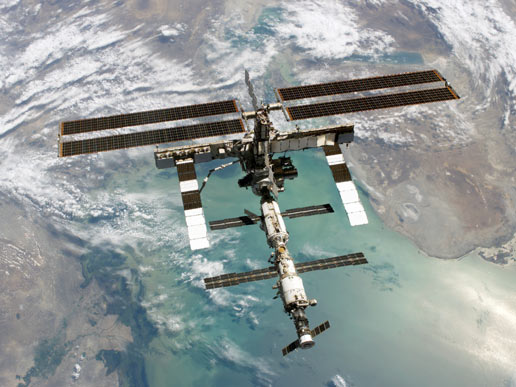SpaceX's Dragon spacecraft lifts off on the Falcon 9 rocket from Cape Canaveral Air Force Station in Florida at 1:52 a.m. EDT Sunday, Sept. 21, carrying about 5,000 pounds of NASA science investigations and cargo are on their way to the International Space Station.The mission is the company's fourth cargo delivery flight to the space station. One of the new Earth science investigations heading to the orbital laboratory is the International Space Station-Rapid Scatterometer. ISS-RapidScat monitors ocean winds from the vantage point of the space station. This information will be useful for weather forecasting and hurricane monitoring. Dragon also will deliver the first-ever 3-D printer in space, biomedical hardware and other biological research including a new plant study. Dragon is scheduled to be grappled at 7:04 a.m. on Tuesday, Sept. 23, by Expedition 41 Flight Engineer Alexander Gerst of the European Space Agency, using the space station's robotic arm to take hold of the spacecraft. Dragon is scheduled to depart the space station in mid-October for a splashdown in the Pacific Ocean, west of Baja California, bringing from the space station almost 3,200 pounds of science, hardware and crew supplies. Credit: NASA/Sandy Joseph and Kevin O'Connell.

The International Space Station. Credit: NASA
Showing posts with label FALCON 9. Show all posts
Showing posts with label FALCON 9. Show all posts
Sunday, September 28, 2014
FALCON 9 ROCKET HEADS INTO SPACE
FROM: NASA
SpaceX's Dragon spacecraft lifts off on the Falcon 9 rocket from Cape Canaveral Air Force Station in Florida at 1:52 a.m. EDT Sunday, Sept. 21, carrying about 5,000 pounds of NASA science investigations and cargo are on their way to the International Space Station.The mission is the company's fourth cargo delivery flight to the space station. One of the new Earth science investigations heading to the orbital laboratory is the International Space Station-Rapid Scatterometer. ISS-RapidScat monitors ocean winds from the vantage point of the space station. This information will be useful for weather forecasting and hurricane monitoring. Dragon also will deliver the first-ever 3-D printer in space, biomedical hardware and other biological research including a new plant study. Dragon is scheduled to be grappled at 7:04 a.m. on Tuesday, Sept. 23, by Expedition 41 Flight Engineer Alexander Gerst of the European Space Agency, using the space station's robotic arm to take hold of the spacecraft. Dragon is scheduled to depart the space station in mid-October for a splashdown in the Pacific Ocean, west of Baja California, bringing from the space station almost 3,200 pounds of science, hardware and crew supplies. Credit: NASA/Sandy Joseph and Kevin O'Connell.
SpaceX's Dragon spacecraft lifts off on the Falcon 9 rocket from Cape Canaveral Air Force Station in Florida at 1:52 a.m. EDT Sunday, Sept. 21, carrying about 5,000 pounds of NASA science investigations and cargo are on their way to the International Space Station.The mission is the company's fourth cargo delivery flight to the space station. One of the new Earth science investigations heading to the orbital laboratory is the International Space Station-Rapid Scatterometer. ISS-RapidScat monitors ocean winds from the vantage point of the space station. This information will be useful for weather forecasting and hurricane monitoring. Dragon also will deliver the first-ever 3-D printer in space, biomedical hardware and other biological research including a new plant study. Dragon is scheduled to be grappled at 7:04 a.m. on Tuesday, Sept. 23, by Expedition 41 Flight Engineer Alexander Gerst of the European Space Agency, using the space station's robotic arm to take hold of the spacecraft. Dragon is scheduled to depart the space station in mid-October for a splashdown in the Pacific Ocean, west of Baja California, bringing from the space station almost 3,200 pounds of science, hardware and crew supplies. Credit: NASA/Sandy Joseph and Kevin O'Connell.
Subscribe to:
Comments (Atom)
